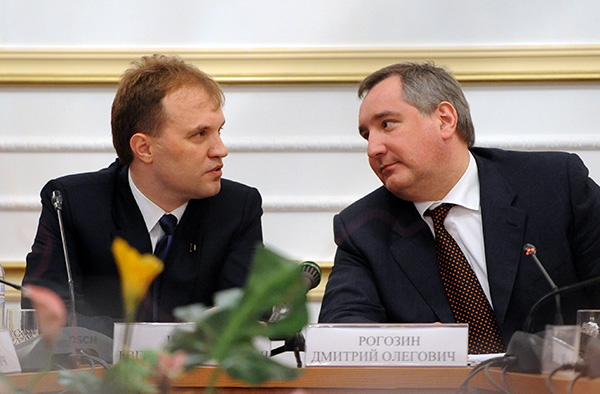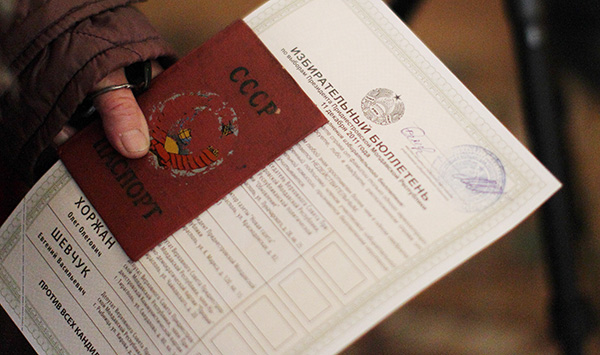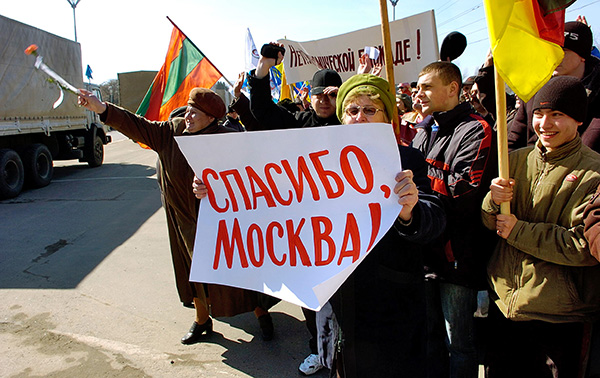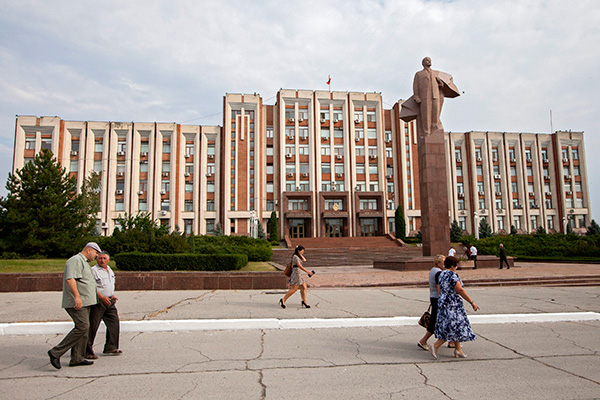Head of the Foreign Ministry of Pridnestrovie Nina Shtanski in an interview to the Russkaya Planeta (Russian Planet) told about the historical self-determination, external threats and the conditions for a peaceful settlement
It is talked again today about the deteriorating situation in the Pridnestrovian Moldavian Republic, around which the Ukrainian and Moldovan blockade ring has finally closed. The main hope of Pridnestrovians for peace and prosperity has always been and remains connected with Russia which is facing new challenges now.
— The reunification of Russia and Crimea gave hope to Pridnestrovie. In March 2014 the PMR’s Supreme Council addressed to the State Duma of the Russian Federation a request to draft a law that would allow the republic to be admitted to the Russian Federation. The PMR has remained an unrecognized part of the Russian Federation for many years. What have the belief in Russia and hope for reuniting with it been nourished with all this time?
— It should be noted that not the joining of Crimea gave hope to Pridnestrovie. The hope of Pridnestrovians have always been connected with Russia: we feel like a part of it, a part of the Russian world, once a single large country. But of course, we are encouraged by the way the Crimean issue has been resolved because the top priority has been given to the same historical and legal arguments which Pridnestrovie appeals to.
The circumstances were such that we were divided against our will and contrary to our choice. We, I remind, did not secede from the Soviet Union, but on the contrary, when such decision was taken by Moldavia which chose the way of self-determination and Romanization, we held a referendum on whether to remain part of the then-existing de facto and de jure Union. Therefore, Pridnestrovie is a victim of the essentially not completed from the legal point of view collapse of the Soviet Union. International and state jurists are still looking for answers to questions raised by the situation. However, we must admit that the historical and legal background of statehood formation and especially its international recognition, as can be seen from some of the examples of recent history, the brightest of which is Kosovo, took a back seat, giving way to the so-called geopolitical expediency and simply double standards.
But Russia has never given reason to doubt that Pridnestrovie will always find support through it. Our ties strengthen step by step, the cooperation develops in almost all fields, from trade and economic cooperation to cultural exchange. Besides, the main thing should not be forgotten - Russia has maintained peace in Pridnestrovie for 23 years, guaranteeing us the opportunity to live and develop.
— Russian legislation is already in effect in Pridnestrovie. What other integration tools, agreements on cooperation with the Russian Federation are working now and will be applied in the future?
— Indeed, Pridnestrovie is steadily moving towards maximum integration into the Russian legal field. As for the documents, more than two dozen of them were signed for the last year. The widely known Rogozin – Shevchuk Protocol was signed in 2013. In elaboration of it 15 memoranda on interdepartmental cooperation were signed in 2014, which became the basis for a direct interaction between departments of the PMR and Russia. The establishment of contacts between the departments of the economic sector plays a special role in this context. The arrangements in this area have allowed us today to enter into the import substitution programme of the Russian Federation; transportation documentation of Pridnestrovie is recognized by the customs authorities of the Russian Federation, the Certification Center of the Russian Federation has been opened in the republic. All of this can significantly simplify access of goods from Pridnestrovie to the Russian markets. However, the blockade obstacles on the part of Moldavia and Ukraine, unfortunately, prevent us from fully launching all the potential mechanisms for the development of trade and economic cooperation.
— Historically, Pridnestrovie was completely or partially as part of the Golden Horde, the Polish–Lithuanian Commonwealth, the Russian Empire, Ukraine, Moldavia, was occupied by Romania. Why choosing Russia is more relevant for the PMR today?
— This question can be answered by the history. Since the end of the XVIII century Russia paid great attention to the development of territories of modern Pridnestrovie. The area was actively populated by various peoples, unique conditions for the development of the economy and infrastructure were created. Later, by the efforts of the Soviet Union, Pridnestrovie became a highly developed industrial region. Pridnestrovian enterprises, many of which were single in the entire Soviet Union, were known all over the country. Russian, Ukrainians and Moldovans peacefully and happily lived and worked here. Many scientists and experts note that this is in Pridnestrovie where there was the same ‘Soviet people’ as a unique inter-ethnic community. Furthermore, Pridnestrovie is part of Russian history, the region of glorious victories of the Russian soldier. The phenomenon of the special Pridnestrovian identity has valuable basis, and therefore, the choice of Pridnestrovians have not been broken by any military aggression, long-term sanctions and blockades.
— How strong is the Soviet legacy in the political and social life of today's Pridnestrovie?
— You know, there is a widespread, especially in the Western media, idea that Pridnestrovie ‘is stuck in the USSR’. Write the name of the republic in the English-language Google - and you will immediately see the photos of the monument to Lenin and our coat of arms, largely replicated the Soviet symbols. This element of our identity is as impressive for foreign journalists that they often do not trouble themselves with other observations. Once as a graduate student at MGIMO I had a lot of work on the theme of the identity. The factor of ‘Pridnestrovian Sovietness’ worked out in my dissertation research, was, perhaps, the most common cause for debate with colleagues. The answer is quite simple. Pridnestrovie lost a lot since the collapse of the USSR, and what other states quickly acquired in return, we had to defend, including resisting armed aggression on the part of neighbours. We honour our history and see no point in “fighting with the monuments”. Respect for history does not prevent us to be a modern established state.
You know, a few years ago I came across a social research which indicated that one in five Pridnestrovian pensioner after the collapse of the Soviet Union never traveled outside of Pridnestrovie. Do you understand?
By the way, many old people have still Soviet passports. And they are still valid here.
— Is there an active vector towards the unification of Moldavia and Romania? What threats from it to Pridnestrovie do you see?
— Such a movement during the period of the collapse of the Soviet Union gave rise to aggressive nationalism in Moldavia and then the armed aggression against us. Naturally, the subject is sensitive for us; it’s not the kind of thing you forget. And nobody apologized. However, today, when Moldavia and Pridnestrovie de facto exist as two independent states, we are in favor of good-neighbourly relations based on cooperation. We have chosen our path and this path is the integration with Russia and the Russian world. This absolutely does not preclude from building good relations based on friendly policy with Moldavia and Ukraine, whose leadership has set a course for the European integration.
— Today, Bessarabia is again talked about, whose territory is now divided between Pridnestrovie, Ukraine and Moldavia. Is the historic reunification of Bessarabia possible, and what is Pridnestrovie’s attitude to it?
— A small part of modern Pridnestrovie was really a part of Bessarabia ... With such discourse we'll get to the Palaeolithic age (laughing). I'm sure another solution such as the reestablishment of the USSR, for example, would be greeted with universal rejoicing in Pridnestrovie. But this is an unrealizable ‘romance of the past’. We need to look to the future. Pridnestrovie’s choice has been made and repeatedly confirmed, including by the people. De facto Pridnestrovie today meets all the attributes of statehood which are accepted in international law. It is not only the existence of its own and self-controlled territory, the people, the legislation, a democratically elected government, the formed and well-functioning system of government institutions, the monetary and credit system, the army, etc. This is also an international legal personality in the international arena where the PMR presents itself on its own and defends its interests including in a multilateral international negotiation format, the so-called ‘5+2’ format. Furthermore, Pridnestrovie has already been recognized by South Ossetia and Abkhazia which is recognized by Russia and a number of states, with which we have diplomatic relations, agreements on friendship and cooperation have been signed. Our diplomatic missions are operating there. So at this stage, Pridnestrovie is a state with limited international personality, striving for international recognition.
— How strong are the ties with the Odessa Oblast and Ukraine in general, what impact do the Donbass war and economic blockade have on them?
— We have always had friendly, even family relations with the Odessa Oblast. We have always had a well-developed trade, especially the border trade. For the Pridnestrovian economy the Odessa region is an important transport corridor for exports. Unfortunately, the situation significantly deteriorated over the past year. Trade and economic cooperation not only with Odessa, but also throughout Ukraine declined manyfoldly. The border trade almost disappeared. The rhetoric emerged in Ukraine about the ‘Pridnestrovian threat’ became a certain psychological blow for us. Ukraine introduced restrictive measures against the holders of Russian citizenship - people often simply cannot cross the Ukrainian border. Many fear to go to Ukraine. This, unfortunately, is a fact.
The Pridnestrovian leadership constantly emphasizes that we wish the people of Ukraine to stabilize the situation as soon as possible and we hope that in the near future our relations will change for the better. There has never been another attitude toward Ukraine here and I'm sure there will not.
Pridnestrovie remembers very well as Ukraine, namely the Odessa region in 1992 hosted refugees from Pridnestrovie. 90,000 women, old people and children who took cover from the shells and fled from the terrible threat of an armed extermination, found there a shelter, support and understanding. We remember.
— If there was no economic blockade, what Pridnestrovie might be like, what can you offer Russia in terms of cooperation? How are relations with other countries, with the EU?
— According to our calculations, if all today’s existing blockade restrictions to the Pridnestrovian economy were removed, in 3-5 years we would become self-sufficient country in the truest sense of the word. Our products have always been in demand both in Russia and in Europe. The only question is that it is often cannot get there or under the customs and other blockade restrictions is uncompetitive. In addition, the Pridnestrovian economy has high investment potential, we are also a convenient logistics hub.
We are ready to cooperate with everyone. The main thing is that the interaction shall be equal and devoid of sanctions, threats and pressure.
— Why do people prefer to live in Pridnestrovie, do people from other countries move there to live in? Is not there a problem of out migration from the region, especially now?
— There is out migration, unfortunately, and it is an objective reality: Pridnestrovie throughout its whole history has been in difficult socio-economic conditions. In 2007 our current President and then Chairman of the Supreme Council Yevgeny Shevchuk spoke at the hearings in the State Duma, devoted to the issue of the unrecognized republics. He gave the following data. Before the collapse of the Soviet Union in Pridnestrovie (according to the census of those years) more than 800 thousand people lived, after the armed phase of the conflict and in the conditions of the blockade survival about 500 thousand remained. Thus, within a short historical period the population of the republic reduced for a few hundred thousand people who left their homes and families in search of a better life. Is not this the result of the war that continues in other, non-military methods? Then Yevgeny Shevchuk requested the recognition of Pridnestrovie...
People still leave in search of a different life, and I can understand them. At the same time, many return, build houses, and raise children in the PMR. Why is that? Because it is their homeland, where they grew up, where peace, a great climate, and friendly people are. People from neighbouring countries, especially from Moldavia, come in Pridnestrovie, however, mainly Russian-speaking pensioners. Payments are smaller here, last year until the increased blockade pensions were bigger, crime is much weaker. Elderly people from Russia, who once were here on business and remember how gracious this region is, also come here. Nature, wonderful climate, friendly people, delicious food, fruits, vegetables, sanatorium- resort base... Especially they come to the picturesque Kamensky district. But Moldovan and foreign media do not write about it. For many it is profitable to create a negative image of Pridnestrovie as a ‘black hole’ from which people are fleeing.
— What are the problems with obtaining passports of the Russian Federation today? How many people hold Russian passport, how many – Moldovan one and the passport of the Soviet Union? What does the Russian passport mean for you?
— It turned out that until 2006 to obtain Russian citizenship was very difficult. Many people in obtaining citizenship were guided not by their choice, but by the ability: they received one, which was fast to receive. As a result, there are nearly 200 thousand citizens of Russia and almost 100 thousand – of Ukraine. Moldavia, alas, a few years ago chosen the path of compulsory documentation. When a Pridnestrovian applied to receive a certificate of an apatride (and without this it was impossible to get Russian or Ukrainian citizenship), the applicant without his consent was provided with the Moldovan citizenship. For many it was a sentence, closing the path to citizenship of the Russian Federation.
Today, the efforts of the Russian side in the sphere of the consular service in Pridnestrovie are strengthening again. After a four-year break the procedure for obtaining Russian citizenship, that took place in 2006, resumed. Thousands of people, who have not received citizenship of other countries, became Russian citizens only for six months.
A broad positive response and appreciation were caused in Pridnestrovie by the recent speech of Deputy Prime Minister Dmitry Rogozin, who urged the State Duma to amend the law on citizenship in order for the Pridnestrovian youth born after 1992 to obtain a Russian passport. Alas, today this group of people is limited in that right. We hope that the issue will soon be resolved.
For Pridnestrovians the Russian passport is a documentary evidence of the historical and mental belonging to Russia and the Russian world. This is a subject for genuine pride, that ‘precious cargo’, mentioned by Vladimir Mayakovsky.
— Statements by the republic’s leadership about the possible Romanian-Moldovan-Ukrainian aggression — a caution or you actually are considering such a scenario? How ready is the PMR for a military threat, can it be a ‘hot war’ and who needs it? This is a direct conflict with Russia, with our troops…
— The Head of the State has repeatedly stated that we do not have information about direct military threat. Our President always says that we are not a source of threat to anyone else. Our policy is peace-loving and security policy is purely defensive in nature. However, we sincerely believe and hope that no one would ever think to bring the situation in Pridnestrovie to armed aggression. We have never wanted war, but we endured one, so we particularly appreciate peace.
— What are the conditions under which the Russian peacekeeping contingent will not be necessary?
— They are commonly known: the achievement of a full-scale peaceful political settlement of the conflict and the development of a sustainable and effective formula of relations between the parties, which shall, of course, take into account the will of the people. Only in such a situation, when there is a viable architecture of stability, we can say that the mission of the peacekeepers is completed. By the way, this approach is enshrined in the negotiation process. Synchronization of complete and final settlement of the peacekeeping mission is enshrined in the agreements and the statements at high-level, including in the joint statements of the conflicting parties. The principle of synchronization lies at the basis of the positions of some international partners, including the OSCE (then the CSCE), which in 1993 reflected it in its recommendations.
In 1994, having initiated the multilateral internationalized negotiation process, Moldavia and Pridnestrovie agreed to consider the experience of settling in other parts of the world and the will of the people, that today, truth be told, Kishinev prefers not to remember.
According to the Pridnestrovian side, the ultimate civilized ‘divorce’ of Pridnestrovie and Moldavia should become the formula for the peaceful settlement given and realities, international experience and the will of the people.
Source: rusplt.ru












